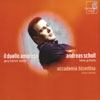Handel (Il) Duello Amoroso
The liquid beauty of Scholl's voice shines in Handel's subversive mini - 'operas'
View record and artist detailsRecord and Artist Details
Composer or Director: George Frideric Handel
Genre:
Vocal
Label: Harmonia Mundi
Magazine Review Date: 5/2007
Media Format: CD or Download
Media Runtime: 72
Mastering:
Stereo
DDD
Catalogue Number: HMC901957

Tracks:
| Composition | Artist Credit |
|---|---|
| Amarilli vezzosa, '(Il) duello amoroso' |
George Frideric Handel, Composer
Accademia Bizantina Andreas Scholl, Alto George Frideric Handel, Composer Hélène Guilmette, Soprano Ottavio Dantone, Conductor |
| Nel dolce tempo |
George Frideric Handel, Composer
Accademia Bizantina Andreas Scholl, Alto George Frideric Handel, Composer Ottavio Dantone, Conductor |
| Vedendo amor |
George Frideric Handel, Composer
Accademia Bizantina Andreas Scholl, Alto George Frideric Handel, Composer Ottavio Dantone, Conductor |
| Trio Sonatas, Movement: ~ |
George Frideric Handel, Composer
Accademia Bizantina George Frideric Handel, Composer Ottavio Dantone, Conductor |
| Mi, palpita il cor |
George Frideric Handel, Composer
Accademia Bizantina Andreas Scholl, Alto George Frideric Handel, Composer Ottavio Dantone, Conductor |
Author: Richard Wigmore
With opera banned by papal decree as a dangerous corrupting force, the 18th-century Roman aristocracy consoled itself with solo or duet cantatas, miniature operas by other means. The young Handel delighted his Italian patrons – and simultaneously honed his fluency in the Italianate vocal style – with dozens of such cantatas, most of them still rarities. Andreas Scholl offers three of them, plus a fourth, Mi palpita il cor, composed during Handel’s early years in London. All are in the pastoral-Arcadian vein beloved of the Italian cultural elite, though Arcadia can be a pretty depressing and cynical place. There are even distinct sado-masochistic overtones in the duet cantata Il duello amoroso, with the would-be macho swain mocked (for what we infer to be impotence) by the spiteful shepherdess Amaryllis.
The Italian cantatas were a fertile quarry for the composer’s operas and oratorios. In Vedendo Amor, for instance, an aria depicting Cupid’s stealthy wiles was the model for Caesar’s famous “hunting” aria in Giulio Cesare. With delicate, insinuating inflections, Scholl creates a graphic sense of the net being drawn around the hapless victim. Elsewhere he sings with all his customary liquid beauty of tone (the middle register darkly resonant, the top notes at times ethereally floated, à la Alfred Deller), eloquence of phrase and expressive immediacy.
In Nel dolce tempo he subtly dramatises the one-man dialogues between shepherd and bashful shepherdess. He relives intensely the torments of love in Mi palpita il cor, and in Il duello amoroso vividly catches each shifting phase of his hopeless battle with Hélène Guilmette’s charmingly venomous tease of a shepherdess.
Pleasure in this delectable recital is completed by the zestful, imaginatively coloured playing of Accademia Bizantina, who on their own give a beguiling and inventive performance of the B minor Trio Sonata – yet another fruitful source for this master recycler among composers.
The Italian cantatas were a fertile quarry for the composer’s operas and oratorios. In Vedendo Amor, for instance, an aria depicting Cupid’s stealthy wiles was the model for Caesar’s famous “hunting” aria in Giulio Cesare. With delicate, insinuating inflections, Scholl creates a graphic sense of the net being drawn around the hapless victim. Elsewhere he sings with all his customary liquid beauty of tone (the middle register darkly resonant, the top notes at times ethereally floated, à la Alfred Deller), eloquence of phrase and expressive immediacy.
In Nel dolce tempo he subtly dramatises the one-man dialogues between shepherd and bashful shepherdess. He relives intensely the torments of love in Mi palpita il cor, and in Il duello amoroso vividly catches each shifting phase of his hopeless battle with Hélène Guilmette’s charmingly venomous tease of a shepherdess.
Pleasure in this delectable recital is completed by the zestful, imaginatively coloured playing of Accademia Bizantina, who on their own give a beguiling and inventive performance of the B minor Trio Sonata – yet another fruitful source for this master recycler among composers.
Discover the world's largest classical music catalogue with Presto Music.

Gramophone Digital Club
- Digital Edition
- Digital Archive
- Reviews Database
- Full website access
From £8.75 / month
Subscribe
Gramophone Full Club
- Print Edition
- Digital Edition
- Digital Archive
- Reviews Database
- Full website access
From £11.00 / month
Subscribe
If you are a library, university or other organisation that would be interested in an institutional subscription to Gramophone please click here for further information.




